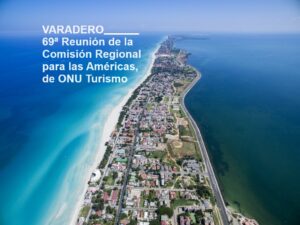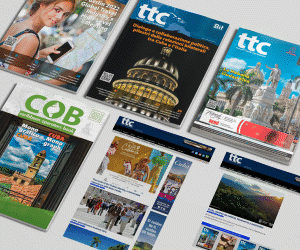“The Americas is the promising territory for tourism”
Interview with Gustavo Santos, UN Tourism Regional Director for the Americas

By Daily Pérez Guillén
The Cuban beach resort of Varadero will host the 69th Meeting of UN Tourism Regional Commission for the Americas (CAM) and the Seminar: Enhancing Tourism Development through Innovation in Community-based Tourism, on April 29 and 30. In the lead up to the event, TTC spoke with Gustavo Santos, UN Tourism Regional Director for the Americas.
What topics will be on the agenda of the meeting of tourism ministers of the Americas this April in Cuba?
The gathering we will hold in April in Varadero, Cuba, corresponds to the meeting of the UN Tourism Regional Commission for the Americas. We hope to bring together representatives of the 26 countries that make up the region and the two Associate Members, as well as the representatives of the private sector that usually accompany us.
Although this is a statutory meeting, it is the moment to work on the priorities we have identified and have been working on, which are linked to connectivity, sustainability, empowerment of women and youth and development of products such as gastronomy and rural tourism, with a strong commitment to education, innovation and attracting investment. The second Amadeus report “Travel Insights 2024: Focus on the Americas,” will also be presented on this occasion.
Within the framework of the Meeting, we will hold the Seminar: Enhancing Tourism Development through Innovation in Community-based Tourism, alongside the Ministry of Tourism of Cuba, which will be an opportunity to learn about good practices in innovation and investments in local communities, human capital, biodiversity and infrastructure, and to seek sustainable alternatives to strengthen community tourism and entrepreneurship for the development of tourism experiences.
You have referred to the need to develop sustainable, inclusive and resilient tourism activity. What is the basis for this?
Tourism will be sustainable or will not exist. Today, all human activities must be rethought in terms of sustainability. That is why on September 27, 2023, when we celebrated World Tourism Day, we decided to dedicate the year to Tourism and Green Investments. Investment is key to the growth of our countries. However, to ensure the development of our communities, sustainability is mandatory. Moreover, this activity, the most human of all productive activities, cannot develop without considering the entire participating community, hence its inclusive nature.
Following the COVID pandemic, it was clear that this activity is one of the most important drivers of development in our countries. For months, especially in our region, tourism was suspended due to lockdowns extended over a long period. This showed how important tourism is for the economies of our countries. However, the whole world, and the Americas particularly, managed to almost match the numbers we had in 2019, despite the global recession process and the increase in the price of airline tickets and travel in general. We are already very close to achieving what was expected to be achieved by 2025. This shows the resilience of our activity.

Gustavo Santos, UN Tourism Regional Director for the Americas. Photo: Patagonia.com
What is your view of Cuba in this scenario of challenges to attract more international travelers and, at the same time, develop sustainable tourism?
The challenge is common to the entire region of the Americas. The secret is to study the demand, see what the new tourist is asking for and know how to interpret this.
International tourists are looking for new, unique experiences that allow them to explore situations they have never experienced before. Our region has that potential; we have to be able to show tourists all the possibilities they may find in the Americas: from the endless beaches and emerald sea of the Caribbean, to the secrets of the jungle, the marshlands and deserts, Antarctica; from the most cosmopolitan cities to the small towns hidden deep in our lands, to the fishing villages on our shores; from the ruins of our ancient cultures to the intelligent cities of the region. The Americas offer an endless number of experiences across all latitudes of the map. Cuba in particular offers us a wonderful sea to enjoy all year round, colonial cities with unique charm, a capital whose historic center is a World Heritage Site and where music invades the streets of Old Havana, and—in addition—the warmth and friendliness of its people.
The region of the Americas is potentially one of the regions that can grow the most in terms of tourism in the coming years. We are a region privileged by nature and, as I said in the case of Cuba, by the warmth of our people and their culture. The keys to the tourism of the future are linked to sustainability and, in this sense, I believe the region has everything to offer.
Do you think it is possible to develop tourism as an economic activity with multi-destination benefits in the region?
Tourism is an economic activity with multi-destination benefits. There is no doubt about this. We have to work with a focus on improving regional cooperation, convinced that we must, among all countries, rebuild travelers’ confidence, promote safe travel experiences for tourists and improve connectivity between our countries. The region needs to be better connected. In this regard, it is essential to work to consolidate a commercial air connectivity network by securing more airlines and more frequencies to connect our destinations. In this regard, in partnership with IATA (The International Air Transport Association), we seek to promote improved connectivity in the region and the expansion of routes to encourage multi-destination tourism and intra-regional transport.
In addition, we have to offer ourselves to the world as a region, coordinating and working collaboratively. We must create regional conditions to promote visits by international tourists and this requires a lot of cooperation work.
Coordinating the tourism ecosystem in our region is necessary to advance together in the same direction: that of the development of our communities, of our people.
How will the Regional Office for the Americas, based in Río de Janeiro, support the evolution of tourism development in the region?
The establishment of the UNWTO Regional Office for the Americas in Río de Janeiro, Brazil, will focus on strengthening the promotion of investments in the region, especially boosting green investments, and developing a strategy around training and capacity building, especially for our youth, to acquire the professional skills they need to grow tourism throughout the region.
Tourism investments create jobs and jobs drive development. If we can showcase our region to the world with the investment opportunities we have to offer, I have no doubt that this will result in development for the entire region. But of course, I insist that we have to be more united than ever.
You were appointed with the objective of “coordinating regional efforts aimed at the recovery of tourism and promoting cooperative work from the north to the south of the Americas.” How do you evaluate this stage of tourism recovery in the region and what do you foresee?
We have already achieved several objectives along these lines. We created the first UNWTO and IDB Observatory for Tourism Law in Latin America and the Caribbean to work on tourism legislation and the protection of tourists. We developed, with the support of CAF (Development Bank of Latin America and the Caribbean), the Tourism Investment Guides, which are documents indicating the opportunities and incentives that each state offers in terms of tourism investment. So far, the investment guides of the Dominican Republic, Colombia, Chile, Ecuador, Paraguay and Uruguay have been presented. We are working with Cuba on its guide, as well as with Peru, Honduras and El Salvador. We hope to announce and present this guide to potential investors soon.
We have begun working with IATA to create a space for airline executives to meet with the tourism authorities of the Americas in order to make progress on connectivity. At the same time, we are working with Amadeus to offer the countries of the region a prospective report on tourism in the Americas that will contribute to making better decisions. The first report was presented at FITUR 2024, the second will be presented in Varadero for the Meeting of the Regional Commission and another is scheduled to be presented around September.
We are initiating the Regional Report on Women in Tourism in Latin America and the Caribbean, in which we hope to reveal the situation in our sector and be able to contribute to the empowerment of women in tourism in the Americas.
We have made progress in a system of training and education scholarships aimed at the countries of our region that most need these opportunities, but also thinking of training that is directly linked to the world of work in order to generate better development opportunities for our communities.
However, above all, we have managed to form a regional work team focused on achieving common objectives and aware of the importance of cooperation as a way of facing the challenges of the post-pandemic world.
The planet’s sustainability reserve is in our region. That is why I maintain that the Americas is the promising territory for tourism. For that reason, what I envision for our future is development with spillover in all our communities.

MORE NEWS










